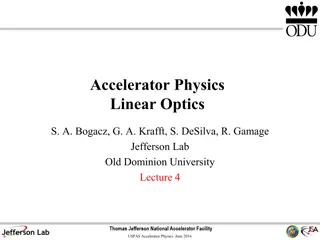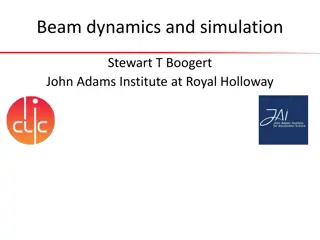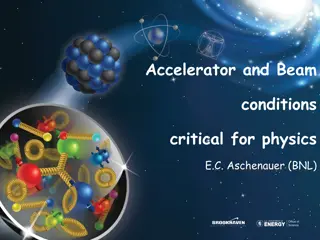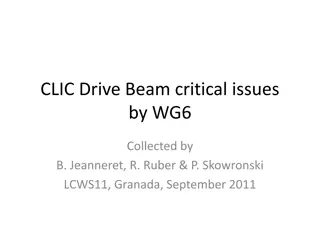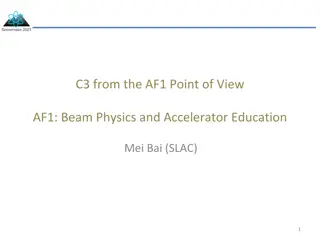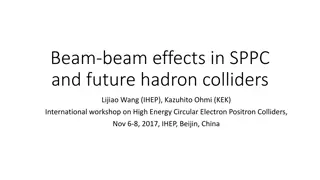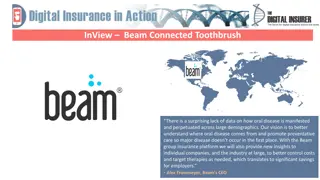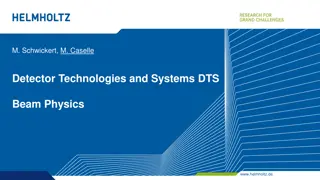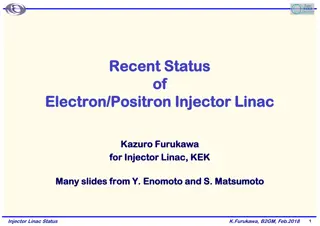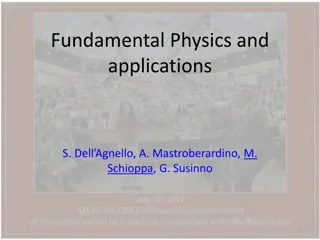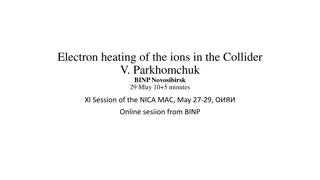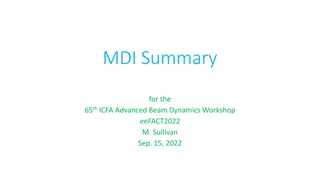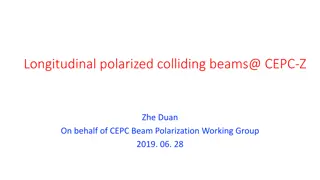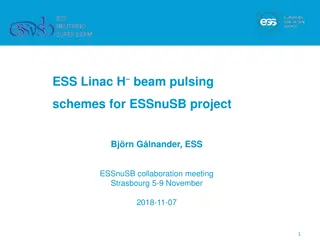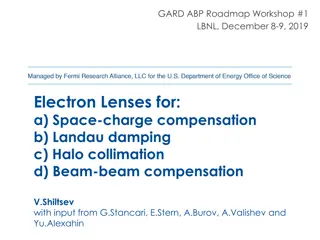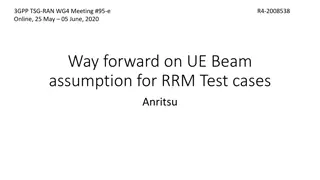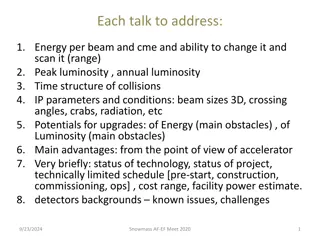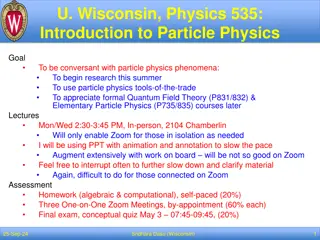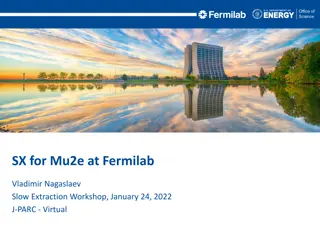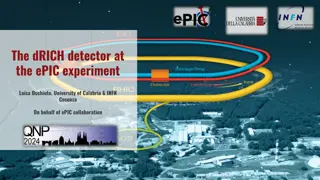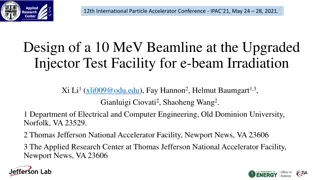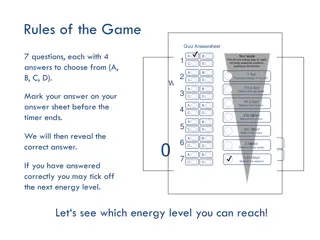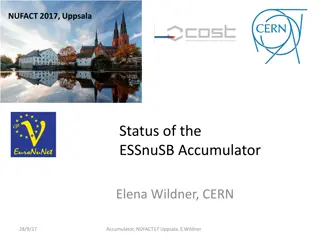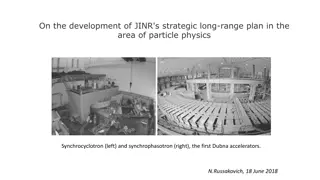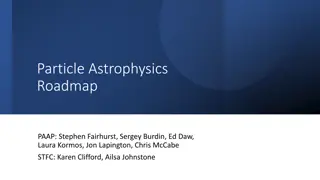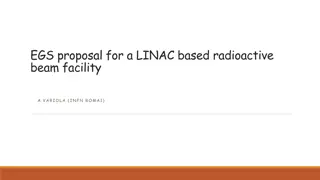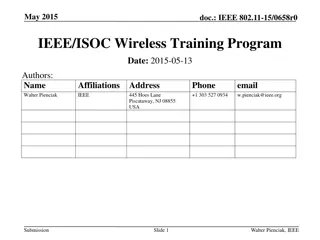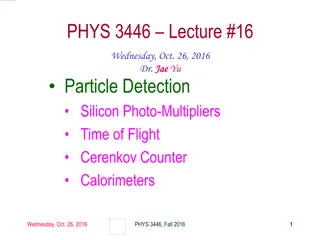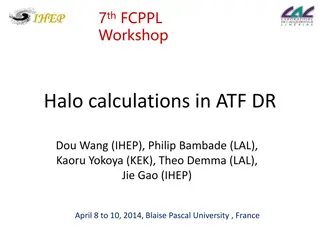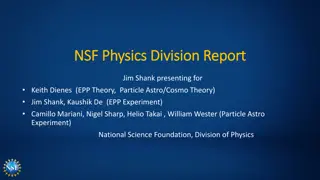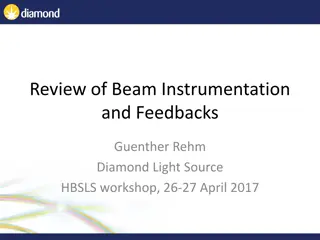European Particle Physics Strategy Update & Accelerator R&D Overview
European Particle Physics Strategy updates serve as the cornerstone for long-term decision-making in the field, with a focus on Accelerator R&D for High Energy Physics. The update process involves key questions, R&D strategies for RF technologies, and implementation plans. Approved strategies emphas
15 views • 25 slides
Linear Beam Optics and Particle Motion in Accelerator Physics
Explore the fundamental concepts of linear beam optics and particle motion in accelerator physics, covering topics such as design trajectory, path length, phase advance, transfer matrix, and more. Understand the intricacies of designing accelerators and the mathematical representations involved in o
2 views • 78 slides
Advancements in Beam Dynamics and Simulation at John Adams Institute
Explore the latest research highlights in beam dynamics and simulation conducted by Stewart T. Boogert at the John Adams Institute in collaboration with Royal Holloway. Learn about the groundbreaking work in wakefield measurement, achieving a beam size of 65 nm, development of beam delivery simulati
2 views • 15 slides
Beam Conditions and Effects in Particle Physics Experiments
Critical accelerator and beam conditions for E.C. Aschenauer's physics research at BNL are discussed, including effects on the main detector, consequences of crossing angle adjustments, important particle beam parameters, and the rotation of the ESR reference plane. Detailed information on beam dive
4 views • 8 slides
Critical Issues in CLIC Drive Beam by Working Group 6 at LCWS11
Issues identified in the CLIC Drive Beam project include RF stability and reliability, beam current stability, RF deflectors in combiner rings, synchrotron radiation power, beam dynamics, operability concerns, machine protection, and beam synchronization challenges. Key areas requiring attention inc
4 views • 5 slides
Recommendations for Advancing Beam Physics and Accelerator Education
The exploration of new physics demands future accelerators beyond 1 TeV lepton colliders and 100 TeV hadron colliders, requiring luminosity in a specific range. Various challenges, including reaching quantum limits, face conventional RF-based beams. The pursuit of disruptive acceleration technologie
6 views • 7 slides
Beam-beam Effects in Future Hadron Colliders Workshop
Explore the beam-beam effects in the SPPC and future hadron colliders, presented at the International Workshop on High Energy Circular Electron-Positron Colliders. The workshop covers weak-strong beam-beam simulations, collision models, and parameter values for the SPPC. Detailed discussions on the
1 views • 32 slides
Analysis of Beam Tracking in IEEE 802.11-19/0007r0 Document
The document "January 2019.doc: IEEE 802.11-19/0007r0" discusses the necessity of beam tracking in the 11md draft. It explores whether beam tracking should be mandatory or optional and provides insights into DMG beam tracking procedures for both TX and RX in wireless communication. The document emph
3 views • 11 slides
Revolutionizing Oral Care with Beam Connected Toothbrush and Insurance Plan
Beam Technologies offers the Beam Brush, a smart toothbrush that integrates with a dental insurance plan to promote preventative oral care, reduce costs, and provide valuable insights on oral health. The Beam Brush and accompanying app track and reward good oral hygiene habits, detect oral diseases,
1 views • 5 slides
Advanced Beam Diagnostics and Control Systems in Beam Physics
Cutting-edge detector technologies like KAPTURE and KALYPSO are revolutionizing beam diagnostics with ultra-fast Terahertz detectors and advanced line-camera systems. The POF III and POF IV projects focus on extreme beam control and diagnostics, aiming to probe femto-scale dynamics of relativistic p
3 views • 8 slides
Overview of Electron/Positron Injector Linac Upgrades at KEK
The recent status of the Electron/Positron Injector Linac at KEK, presented by Kazuro Furukawa, highlights the mission to achieve 40 times higher luminosity in the SuperKEKB collider. The upgrades include low emittance, low energy spread injection beams with higher beam current, new high-current pho
2 views • 23 slides
Advances in Experimental Particle Physics and Metrology Technologies
This collection of images and text highlights the essential aspects of fundamental physics experiments, particle physics detectors, and the Atlas ITk project. It also focuses on the importance of metrology for physics and satellite experiments, with a specific emphasis on laser technologies. The con
11 views • 11 slides
Ion Beam Intensity Enhancement Through Electron Heating in Collider Experiments
The study discusses electron heating of ions in collider experiments at the Collider V. ParkhomchukBINP facility in Novosibirsk. It explores the effects of electron cooling on ion beams, ion beam oscillations, losses, and ion beam intensity enhancement. Various factors such as ion charge, classical
4 views • 9 slides
Highlights of the 65th ICFA Advanced Beam Dynamics Workshop
The 65th ICFA Advanced Beam Dynamics Workshop featured insightful presentations on high currents, luminosity, and beam behaviors. Topics included beam pipe scrubbing, non-gaussian beam tails, and detector backgrounds. Presenters discussed progress in FCCee design, focus magnets, and beampipe concept
4 views • 32 slides
Achieving High Average Beam Polarization in Particle Colliders
Detailed discussion on achieving high average beam polarization in particle colliders like CEPC, focusing on longitudinal polarized colliding beams, beam polarization requirements, basic formulas, and strategies for maintaining beam polarization during physics runs. Emphasis on scenarios involving s
3 views • 16 slides
ESSnuSB Project - Linac Upgrade for Neutrino Beam Generation
Explore the ESSnuSB project's linac upgrade featuring beam pulsing schemes and modifications, aiming to provide an additional 5 MW of beam power for neutrino generation. The upgrade options, pulse structure, beam parameters at 2.5 GeV, and different pulsing schemes are detailed with images and descr
3 views • 10 slides
Electron Lenses in Particle Accelerators: Advancements and Applications
Explore the use of electron lenses in particle accelerators for space-charge compensation, Landau damping, halo collimation, and beam-beam compensation. Learn about their history, applications in Tevatron and RHIC colliders, and current research areas. Electron lenses have shown promise in enhancing
1 views • 44 slides
Update on UE Beam Assumption for RRM Test Cases in 3GPP Meetings
The latest developments in 3GPP meetings regarding UE beam assumption for RRM test cases are outlined. Discussions include the need for UE beam type assumptions, updates to test cases for FR2, and upcoming presentations focusing on specific test cases and beam assumptions per test group. Test purpos
5 views • 9 slides
Particle Physics Facility Overview and Technical Maturity Assessment
This content delves into various aspects of particle physics facilities, including energy per beam, luminosity, collision time structure, IP parameters, upgrade potentials, advantages, technologies, and project status. It also provides details on facility descriptions, technical maturity, and standa
7 views • 5 slides
Introduction to Particle Physics at U. Wisconsin: Physics 535
Dive into the captivating world of particle physics with Physics 535 at University of Wisconsin. Explore phenomena, delve into Quantum Field Theory and Elementary Particle Physics, and prepare for research work. Engage in in-person lectures supplemented by Zoom for those in isolation. Utilize textbo
11 views • 8 slides
Overview of Mu2e Slow Extraction Workshop at Fermilab by Vladimir Nagaslaev
This content discusses the Mu2e project at Fermilab, focusing on slow extraction techniques for beam delivery. It covers beam facilities, characteristics of Muon Campus, design requirements, beam losses, new MARS simulations, and losses in the extraction beam line. Details include beam kinetics, spi
5 views • 17 slides
Overview of CAIN Particle Tracking Code for High-Energy Colliders
CAIN is a particle tracking code used for high-energy collider simulations since 1984. Initially named ABEL, it evolved to include beam-laser interactions for gamma-gamma colliders. The code, written in FORTRAN 90, handles beam-beam and external fields, with a structure where all particles are store
2 views • 17 slides
Particle Physics at CERN: A Multinational Conference Experience
Participants from various European cities engage in a video conference at CERN, discussing particle physics topics like pronunciation of particle names, technical terms, and multiple-choice questions. Interactions involve learning about the Large Hadron Collider, particle collisions, and particle de
9 views • 25 slides
Particles and Detectors in Particle Physics Conference
Delve into the world of particle physics with a focus on particle detectors and pronunciation of particle names. Join a diverse group of participants from various countries as they discuss topics like the Large Hadron Collider and particle interactions. Test your pronunciation skills and learn about
7 views • 25 slides
Performance Studies of dRICH Detector at ePIC Experiment
The Electron-Ion Collider ePIC experiment focuses on the performance studies of the dRICH detector for particle identification crucial in various physics channels. The detector features aerogel optimization, SiPM sensors, and test-beam analyses. Key capabilities include different techniques for part
12 views • 28 slides
Design of a 10 MeV Beamline for E-beam Irradiation at UITF Wastewater Facility
This paper discusses the design of a 10 MeV beamline at the Upgraded Injector Test Facility for electron beam irradiation, focusing on wastewater treatment for environmental restoration. The use of electron beam irradiation is highlighted as an effective method to remove pollutants like 1,4 dioxane
4 views • 9 slides
Particle Physics Quiz - Test Your Knowledge of the Universe!
Engage in a thrilling particle physics quiz with 7 questions to challenge your knowledge! From understanding mass to energy levels and particle interactions, test your skills and learn fascinating facts. Tick off energy steps for each correct answer as you explore the mysteries of the universe. Expl
4 views • 10 slides
Challenges and Design of High-Intensity Accumulator for Neutrino Experiments
The presentation discusses the challenges faced in designing an accumulator for high-intensity particle beams in neutrino experiments at ESS Lund, with a focus on beam loss management, injection efficiency, and intense beam physics issues. The design considerations include beam holding capacity, bea
1 views • 30 slides
Strategic Focus in Particle Physics Development
JINR's strategic long-range plan in particle physics emphasizes elementary particle research, with a primary objective to obtain crucial results from international experiments, such as understanding the Higgs boson and exploring new physics realms. The plan also outlines long-term goals for developi
3 views • 7 slides
Particle Astrophysics Roadmap
Collaboration between various experts in the field of particle astrophysics as part of the Particle Astrophysics Roadmap discusses strategies, research directions, and potential breakthroughs in the realm of astrophysics and particle physics. Addressing key challenges and opportunities, the roadmap
5 views • 8 slides
LINAC-Based Radioactive Beam Facility Proposal
Proposal for a LINAC-based radioactive beam facility at VARIOLA (INFN ROMA1), aiming to serve the needs of the Romanian research community with added value in the present research framework. The project constraints focus on utilizing existing elements, minimizing hardware modifications, and ensuring
0 views • 16 slides
Canada's National Laboratory for Particle and Nuclear Physics
The Canada's National Laboratory for Particle and Nuclear Physics, owned and operated as a joint venture by a consortium of Canadian universities, accelerates science for Canada. This laboratory conducts research in areas such as particle physics, nuclear physics, and materials science. It plays a c
0 views • 7 slides
Laboratory Experiments in Particle Physics
The slides depict a series of experiments conducted at the Large Area Detectors Laboratory in June 2015 at UNICAL. The experiments focused on particle physics, detailing the use of detectors, accelerators, and various systems to investigate sub-nuclear phenomena. The images showcase the equipment, p
0 views • 21 slides
Exploring Particle Detection and Time of Flight in Physics
Delve into the realm of particle detection and time of flight in physics as we dissect topics such as Silicon Photo-Multipliers, Cerenkov Counters, and Calorimeters. Discover how scintillation detectors, time of flight detectors, and other advanced technologies play a crucial role in particle physic
17 views • 15 slides
ATF Damping Ring Beam Halo Generation and Distribution Study
Explore the generation and distribution of beam halo in ATF damping ring, investigating main sources like beam-gas scattering and intrabeam scattering. Calculations, theory foundation, and cross-section analysis are discussed, along with beam distribution due to beam-gas interactions at different pr
0 views • 22 slides
Space Charge and Beam Beam Effects in Accelerators
Explore the impact of space charge and beam beam effects on particle distribution in accelerators, with insights on field calculations, Amperes' Law, and beam component analysis. Learn about classical radius, tuneshift considerations, and practical examples from Fermilab Booster. Discover strategies
0 views • 12 slides
Advanced Particle Physics and Cosmology Research Overview
Explore the latest developments in Particle Physics, Elementar Particles, Particle Astrophysics, and Cosmology through the NSF Physics Division Report. The report covers theoretical and experimental programs, core research areas, and funding opportunities. Get insights into cutting-edge research in
4 views • 15 slides
Beam Instrumentation and Feedbacks Review at Diamond Light Source Workshop
Explore the impact of HB-SLS on beam instrumentation and feedback systems at the HBSLS workshop in April 2017. The review covers topics such as beam position monitors, orbit feedback, bunch-by-bunch monitors, tune monitors, photon beam position monitors, and beam profile measurement.
2 views • 20 slides
Efficient 6D Beam Distribution Reconstruction with Machine Learning
Explore modern challenges in beam diagnostics and learn about advanced techniques like machine learning-based virtual diagnostics and directly measuring 6D beam distributions. Understand the difficulties scaling conventional tomography to 6D and discover optimization methods for inferring beam distr
6 views • 23 slides
IMMW Beam Management for IEEE 802.11-25: November 2024 Update
Explore the latest advancements in Integrated mmWave (IMMW) technology for Wi-Fi networks with a focus on beam management. Discover the motivation behind utilizing millimeter wave frequencies, challenges with high attenuation, beamforming, and beam scanning, and strategies to overcome beam training
3 views • 14 slides

